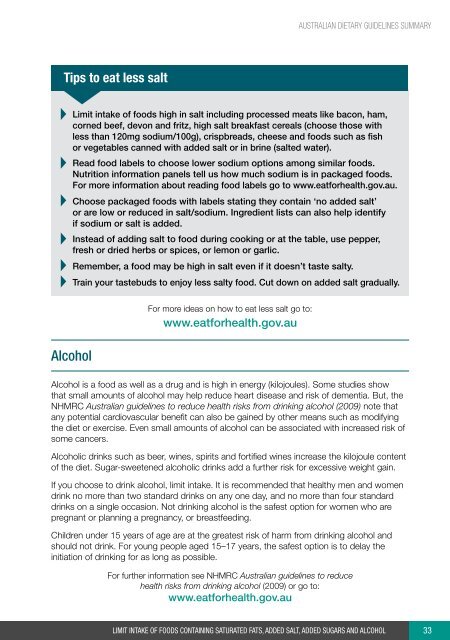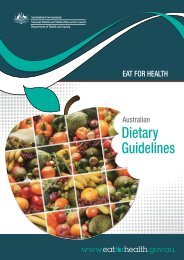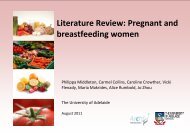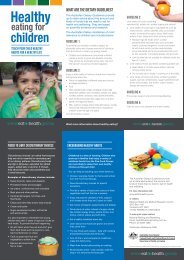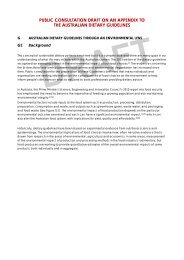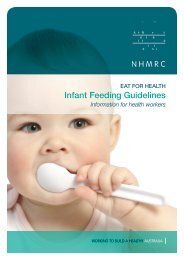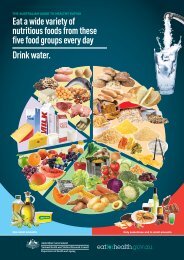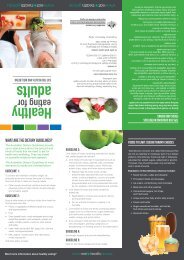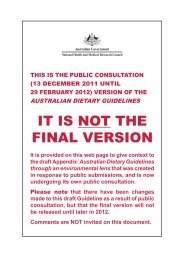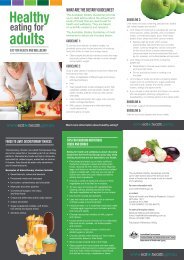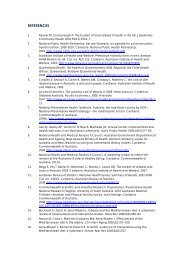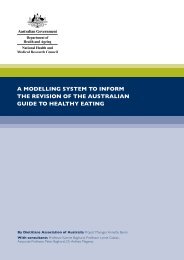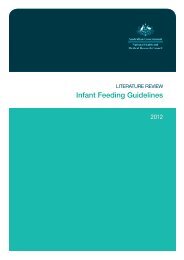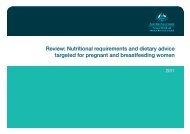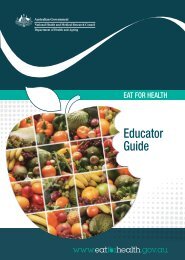Australian Dietary Guidelines - Summary - National Health and ...
Australian Dietary Guidelines - Summary - National Health and ...
Australian Dietary Guidelines - Summary - National Health and ...
- No tags were found...
Create successful ePaper yourself
Turn your PDF publications into a flip-book with our unique Google optimized e-Paper software.
<strong>Australian</strong> <strong>Dietary</strong> <strong>Guidelines</strong> <strong>Summary</strong>Tips to eat less saltLimit intake of foods high in salt including processed meats like bacon, ham,corned beef, devon <strong>and</strong> fritz, high salt breakfast cereals (choose those withless than 120mg sodium/100g), crispbreads, cheese <strong>and</strong> foods such as fishor vegetables canned with added salt or in brine (salted water).Read food labels to choose lower sodium options among similar foods.Nutrition information panels tell us how much sodium is in packaged foods.For more information about reading food labels go to www.eatforhealth.gov.au.Choose packaged foods with labels stating they contain ‘no added salt’or are low or reduced in salt/sodium. Ingredient lists can also help identifyif sodium or salt is added.Instead of adding salt to food during cooking or at the table, use pepper,fresh or dried herbs or spices, or lemon or garlic.Remember, a food may be high in salt even if it doesn’t taste salty.Train your tastebuds to enjoy less salty food. Cut down on added salt gradually.For more ideas on how to eat less salt go to:www.eatforhealth.gov.auAlcoholAlcohol is a food as well as a drug <strong>and</strong> is high in energy (kilojoules). Some studies showthat small amounts of alcohol may help reduce heart disease <strong>and</strong> risk of dementia. But, theNHMRC <strong>Australian</strong> guidelines to reduce health risks from drinking alcohol (2009) note thatany potential cardiovascular benefit can also be gained by other means such as modifyingthe diet or exercise. Even small amounts of alcohol can be associated with increased risk ofsome cancers.Alcoholic drinks such as beer, wines, spirits <strong>and</strong> fortified wines increase the kilojoule contentof the diet. Sugar-sweetened alcoholic drinks add a further risk for excessive weight gain.If you choose to drink alcohol, limit intake. It is recommended that healthy men <strong>and</strong> womendrink no more than two st<strong>and</strong>ard drinks on any one day, <strong>and</strong> no more than four st<strong>and</strong>arddrinks on a single occasion. Not drinking alcohol is the safest option for women who arepregnant or planning a pregnancy, or breastfeeding.Children under 15 years of age are at the greatest risk of harm from drinking alcohol <strong>and</strong>should not drink. For young people aged 15–17 years, the safest option is to delay theinitiation of drinking for as long as possible.For further information see NHMRC <strong>Australian</strong> guidelines to reducehealth risks from drinking alcohol (2009) or go to:www.eatforhealth.gov.auLIMIT INTAKE OF FOODS CONTAINING SATURATED FATS, ADDED SALT, ADDED SUGARS AND ALCOHOL33


